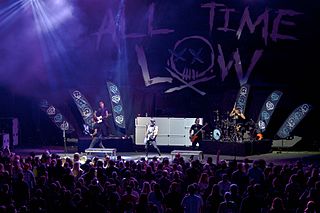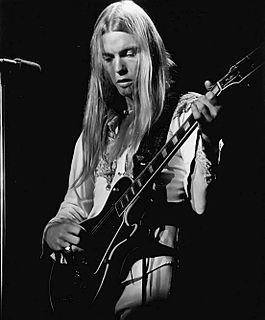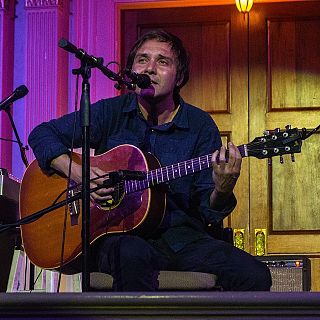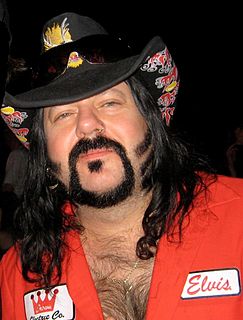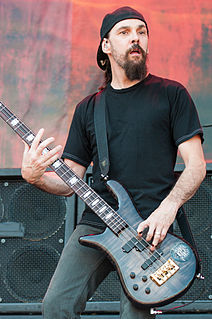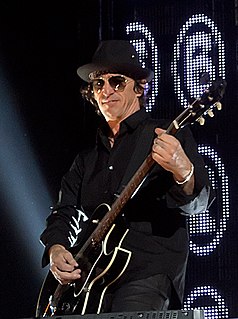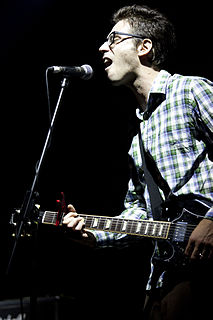A Quote by Borns
My first CD started as a studio project and I record everything with one other guy, so I didn't have a band. That's kind of how I like to do it, though. I like to create it with one other person, this guy, Tommy English, who produces everything. And then I go out on the road with a band who interprets it live.
Related Quotes
There's a lot of discussion about whether you should be a good live band or a good studio band. I think you can use the studio to make a great "studio record" and not necessarily have to reproduce exactly that on stage, but still be a great "live band." Having said that, if what you're going for is just the raw capture of your live sound, then that's cool, too - go for it! I enjoy working in the studio, though, and while I try to get near to an approximation of what's going on onstage, it's not my first priority usually.
I consider us to be one of the first Internet-based bands, especially because we basically started our entire band via the Internet. Before MySpace Music even existed, we had a band MySpace page. We were one of the first fifty bands on PureVolume(.com), and we really built everything from the Internet. That's how we started talking to record labels, that's how we booked our first tours. Without the Internet social networking, like Twitter, we definitely wouldn't be where we are today. It is a huge part of the band.
You take all the time to write a song: you have to let it ooze on out by its natural self and that is pretty time consuming. Then you teach it to the band so everybody gets all the parts. Then you rehearse it and road test it, and all that. Then you get to the studio and there is a new guy in the band who calls himself the producer, right? Huh. He either makes it or breaks it usually before nightfall.
All those experiences were a chance to learn more about music. Playing with the Valley band is like such a "live" band. I mean, really, in many ways Bright Eyes is really a studio project. We form bands to tour, but it really is - you know, we take the songs and we figure out how to decorate them and it's all in the studio, we build the songs that way. Whereas Mystic Valley Band was the exact opposite, where everybody knows what they are gonna be playing on the song and there's sort of a general stylistic approach, and then it's just plug in and play.
Usually when I start a new project there's a fear of the unknown; maybe it's a band I've never been in the studio with before. People are so different. It's almost like you need to go through the process, discover and unlock what it is that makes that band that band. And a lot of times they don't know it.
I do not want and will not take a royalty on any record I record. I think paying a royalty to a producer or engineer is ethically indefensible. The band write the songs. The band play the music. It's the band's fans who buy the records. The band is responsible for whether it's a great record or a horrible record. Royalties belong to the band. I would like to be paid like a plumber. I do the job and you pay me what it's worth.
I enjoy making music alone, and I like keeping my options open for how I release my own songs. But everybody in Grizzly Bear is full of ideas. So it's kind of boring to come to the band with a complete song and be like: "Here's what I want you to do." With this record, we wanted to make everything feel like everyone - music that we could never do on our own. That's a real gift, and it's one of the best things about being in a band like this.
Guy Picciotto had a really sound point: Live albums basically have bands playing songs that are available on studio records, and what example can you think of where the live album is better? What are the great live albums? I have live albums of bands, but I wouldn't listen to them for the most part. So we thought, instead of spending energy trying to puzzle out how to create a live record, let's just write another studio record.
I actually knew Sully's sister, and I was in a band called Stripmind, and then I became roommates with Sully and being out of a band, he asked if I wanted to join in his. Tony was originally the second guitarist in the band; a guy by the name of Lee Richards was the first. The rest is pretty much history.
My dream right now is - and I don't know how to do it, and I don't know if it will work exactly - but just this sort of vague aspiration to start some kind of website where people send in their stories or poems, and me or perhaps some other people turn that into music. And then by the end of the year we make a record and actually put it out. Like a band, but the band is actually a combination of the musician and the fan. I think that's a very 21st-century way of doing it.


